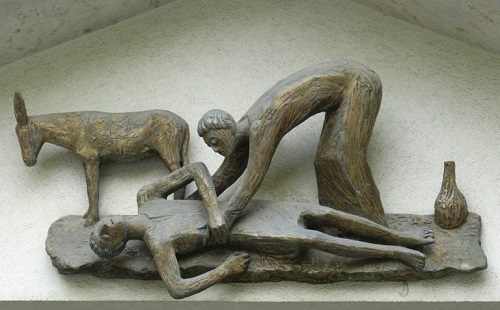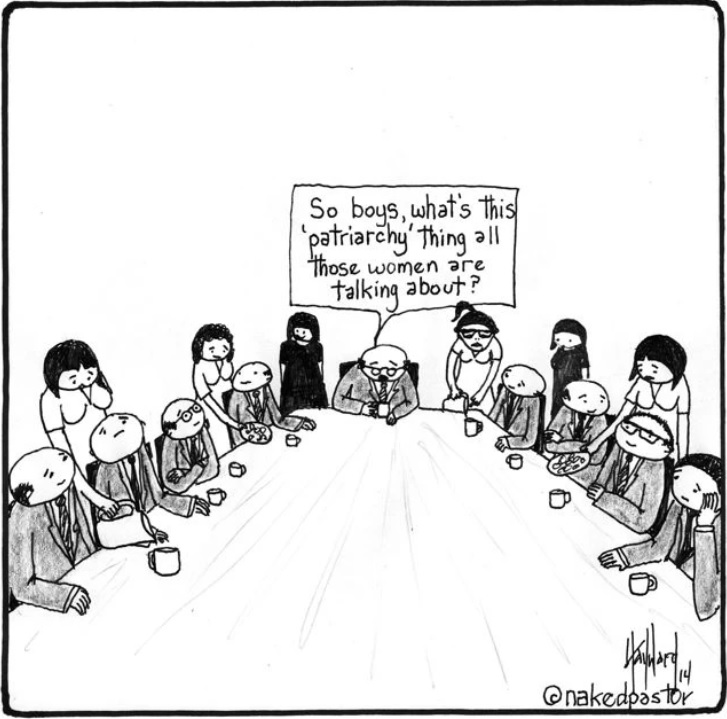
|
Mother Pelican
A Journal of Solidarity and Sustainability
Vol. 16, No. 11, November 2020
Luis T. Gutiérrez, Editor
|
|
|
|

|
|
|
Do As I Say
Regina Bannan
This article was originally published in
The Table, 10 October 2020
REPUBLISHED WITH PERMISSION

The Good Samaritan
|
|
Of course, the central conceit of Pope Francis’s latest encyclical, Fratelli Tutti, is a problem. The deep meaning he attaches to “fraternity” is meant to extend the warm feeling of male bonding to all of humanity. But male bonding leaves me out and leaves me cold.
What does not leave me cold is separating out Francis’s own words, written right now, as opposed to the many quotations from himself, other popes, and random sources from Aristotle to Rahner. I want to use his own words to argue that he could “do as he says” and be open to dialogue about opening ordination to all people.
Certainly we want this document to be as uplifting and resonant as Laudato Si. There was a newness there because Francis elevated the church’s responsibility for the environment in a comprehensive way that had not been done before – and spoke to an emerging consciousness around the world.
Certainly we want universal peace and the end of “just” wars and capital punishment. We want refugees to be welcomed and the poor assisted. We want a politics that abandons domination and an economic system that does not depend on consumerism and capitalism. We want respect for all world religions. As it addresses these topics, this document presents a unified treatment of Catholic social justice teaching – but it feels as if it has all been said by popes before, at least from Leo XIII through Benedict XIV. Francis does say some things that we can use, however.
This is the “woman” paragraph, which reminds me of those documentaries that have a brief focus on women because they have to, and then move on to the “real” concerns: “23. Similarly, the organization of societies worldwide is still far from reflecting clearly that women possess the same dignity and identical rights as men. We say one thing with words, but our decisions and reality tell another story.” After that, women basically disappear except as the occasional victim of trafficking or poverty, or being elderly.
Anyone preparing a homily on the Good Samaritan would find Chapter Two, #101, and #165 really helpful; Francis is clearly deeply involved in thinking about the Christian scriptures. But note the way the woman disappears:
“83. This explains why a Samaritan woman, when asked by Jesus for a drink, answered curtly: ‘How is it that you, a Jew, ask a drink of me, a woman of Samaria?’ (Jn 4:9). The most offensive charge that those who sought to discredit Jesus could bring was that he was ‘possessed’ and ‘a Samaritan’ (Jn 8:48). So this encounter of mercy between a [male] Samaritan and a Jew is highly provocative; it leaves no room for ideological manipulation and challenges us to expand our frontiers. It gives a universal dimension to our call to love, one that transcends all prejudices, all historical and cultural barriers, all petty interests.”
Brackets mine, irony his.
Expanding frontiers provides the opportunity for another useful quote:
“121. No one, then, can remain excluded because of his or her place of birth, much less because of privileges enjoyed by others who were born in lands of greater opportunity. The limits and borders of individual states cannot stand in the way of this. As it is unacceptable that some have fewer rights by virtue of being women, it is likewise unacceptable that the mere place of one’s birth or residence should result in his or her possessing fewer opportunities for a developed and dignified life.”
This throwaway reference to women’s rights should not be thrown away.
Similarly, hold on to the following reflection, concluding with a quotation from the Abu Dhabi joint statement:
“131. For those who are not recent arrivals and already participate in the fabric of society, it is important to apply the concept of ‘citizenship’, which ‘is based on the equality of rights and duties, under which all enjoy justice. It is therefore crucial to establish in our societies the concept of full citizenship and to reject the discriminatory use of the term minorities, which engenders feelings of isolation and inferiority. Its misuse paves the way for hostility and discord; it undoes any successes and takes away the religious and civil rights of some citizens who are thus discriminated against.’”
Transform the following to being about gender:
“147. Let us realize that as our minds and hearts narrow, the less capable we become of understanding the world around us. Without encountering and relating to differences, it is hard to achieve a clear and complete understanding even of ourselves and of our native land. Other cultures are not ‘enemies’ from which we need to protect ourselves, but differing reflections of the inexhaustible richness of human life. Seeing ourselves from the perspective of another, of one who is different, we can better recognize our own unique features and those of our culture: its richness, its possibilities and its limitations. Our local experience needs to develop ‘in contrast to’ and ‘in harmony with’ the experiences of others living in diverse cultural contexts.”
Ordained ministry is not only employment, but consider this:
“162. The biggest issue is employment. The truly ‘popular’ thing – since it promotes the good of the people – is to provide everyone with the opportunity to nurture the seeds that God has planted in each of us: our talents, our initiative and our innate resources. This is the finest help we can give to the poor, the best path to a life of dignity...Since production systems may change, political systems must keep working to structure society in such a way that everyone has a chance to contribute his or her own talents and efforts…In a genuinely developed society, work is an essential dimension of social life, for it is not only a means of earning one’s daily bread, but also of personal growth, the building of healthy relationships, self-expression and the exchange of gifts. Work gives us a sense of shared responsibility for the development of the world, and ultimately, for our life as a people.”
I have only removed some quotations which are not necessary, in my opinion, wherever I have put in ellipses.
On the other hand, I find all of this valuable:
“203. Authentic social dialogue involves the ability to respect the other’s point of view and to admit that it may include legitimate convictions and concerns. Based on their identity and experience, others have a contribution to make, and it is desirable that they should articulate their positions for the sake of a more fruitful public debate. When individuals or groups are consistent in their thinking, defend their values and convictions, and develop their arguments, this surely benefits society. Yet, this can only occur to the extent that there is genuine dialogue and openness to others. Indeed, ‘in a true spirit of dialogue, we grow in our ability to grasp the significance of what others say and do, even if we cannot accept it as our own conviction. In this way, it becomes possible to be frank and open about our beliefs, while continuing to discuss, to seek points of contact, and above all, to work and struggle together.’ [Querida Amazonia] (A note: somewhat ironic in light of what was left out of that; maybe the Pope is planning further dialogue.) Public discussion, if it truly makes room for everyone and does not manipulate or conceal information, is a constant stimulus to a better grasp of the truth, or at least its more effective expression. It keeps different sectors from becoming complacent and self-centred in their outlook and their limited concerns. Let us not forget that ‘differences are creative; they create tension and in the resolution of tension lies humanity’s progress.’” [From the film Pope Francis: A Man of His Word, by Wim Wenders]
Sometimes, reading this document, I feel as if our culture, to the Pope, is what he more frequently refers to as “ideology.” But that is not necessary:
“218. All this calls for the ability to recognize other people’s right to be themselves and to be different. This recognition, as it becomes a culture, makes possible the creation of a social covenant. Without it, subtle ways can be found to make others insignificant, irrelevant, of no value to society. While rejecting certain visible forms of violence, another more insidious kind of violence can take root: the violence of those who despise people who are different, especially when their demands in any way compromise their own particular interests.”
Francis then addresses what that social contract might mean:
“221. Such a covenant also demands the realization that some things may have to be renounced for the common good. No one can possess the whole truth or satisfy his or her every desire, since that pretension would lead to nullifying others by denying their rights. A false notion of tolerance has to give way to a dialogic realism on the part of men and women who remain faithful to their own principles while recognizing that others also have the right to do likewise. This is the genuine acknowledgment of the other that is made possible by love alone. We have to stand in the place of others, if we are to discover what is genuine, or at least understandable, in their motivations and concerns.”
Finally, forgiveness:
“241. Nor does this mean calling for forgiveness when it involves renouncing our own rights, confronting corrupt officials, criminals or those who would debase our dignity. We are called to love everyone, without exception; at the same time, loving an oppressor does not mean allowing him to keep oppressing us, or letting him think that what he does is acceptable. On the contrary, true love for an oppressor means seeking ways to make him cease his oppression; it means stripping him of a power that he does not know how to use, and that diminishes his own humanity and that of others. Forgiveness does not entail allowing oppressors to keep trampling on their own dignity and that of others, or letting criminals continue their wrongdoing. Those who suffer injustice have to defend strenuously their own rights and those of their family, precisely because they must preserve the dignity they have received as a loving gift from God. If a criminal has harmed me or a loved one, no one can forbid me from demanding justice and ensuring that this person – or anyone else – will not harm me, or others, again. This is entirely just; forgiveness does not forbid it but actually demands it.
242. The important thing is not to fuel anger, which is unhealthy for our own soul and the soul of our people, or to become obsessed with taking revenge and destroying the other. No one achieves inner peace or returns to a normal life in that way…Nothing is gained this way and, in the end, everything is lost.”
Those of us who do not want the church to lose everything – and that is what is at stake – must call for the Pope and everyone who has power in the church to do as he says.

The problem with the patriarchy is it doesn't know it exists.
Cartoon by David Hayward (Nakedpastor)
|
ABOUT THE AUTHOR
Regina Bannan is Professor of American Studies at Temple University, Philadelphia, Penssylvania, and a regular contributor to The Table
|
|
|
|
|
"Those who raise walls will end up as slaves
within the very walls they have built."
Pope Francis, Fratelli Tutti, 2020
|
|
Page 4
|
|
FREE SUBSCRIPTION
|
![[groups_small]](groups_small.gif)
|
Subscribe to the
Mother Pelican Journal
via the Solidarity-Sustainability Group
Enter your email address:
|
|
|
|